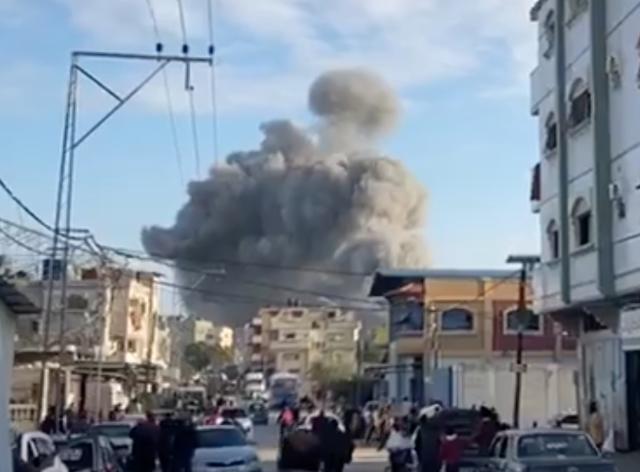The Israeli Defense Forces (IDF) have been involved in a severe confrontation with Palestinian militants in the vicinity of Khan Younis, particularly near its principal hospital in Gaza. This area has become a focal point of distress, with numerous patients and displaced individuals caught in the crossfire. The IDF's extended three-month campaign against Hamas has led to the mandatory evacuation of several sections of downtown Khan Younis, including critical medical facilities like Nasser Hospital where it is likely many militants are embedded as they have been in hospitals in the North of Gaza. The United Nations, whose facilities have also been used by militants to launch attacks, reports that this district is not only home to approximately 88,000 Palestinians but also provides refuge to an additional 425,000 individuals displaced by the ongoing conflict.
The international medical humanitarian organization Doctors Without Borders has shed light on the grave circumstances prevailing in the region. They emphasize that evacuation for many, including their personnel and the 850 patients at Nasser Hospital, is not a viable option due to the inaccessibility and extreme danger in the surrounding areas. Nasser Hospital, a pivotal institution for the treatment of the critically ill in southern Gaza, continues to operate under these challenging conditions. Hamas often fires on Palestinian civilians who are fleeing conflict zones in order to keep them as a human shield against Israeli strikes.
The IDF releases footage of the Givati Brigade’s operations in southern Gaza’s Khan Younis over the past day, during which it says troops killed numerous Hamas operatives and raided the terror group’s sites.
— Emanuel (Mannie) Fabian (@manniefabian) January 24, 2024
The Givati Brigade in recent days had carried out an offensive with… pic.twitter.com/bLaX8hDdUV
Israeli Prime Minister Benjamin Netanyahu is resolute in his objective of achieving a "complete victory" over Hamas. The hostilities commenced following an attack by Hamas on October 7th, which led to substantial Israeli casualties and kidnappings.
The IDF has escalated its military activities in Khan Younis, targeting not only combatants but also impacting civilian infrastructure. A notable incident involved a tank attack on a U.N. training center in Khan Younis, which was sheltering around 800 people, resulting in numerous casualties. The Israeli government maintains and has provided compelling evidence that Hamas militants frequently operate in proximity to U.N. facilities and other civilian areas.
This is insane.
— Merav Guttman 🇮🇱 (@MeravGuttman) January 24, 2024
Friday in Khan Younis. IDF drone identifies a suspicious person inside a building. Turns out it's an elderly woman, her hands tied, lying on a bed. IDF investigator goes in with the force, after they make sure it's not a trap. They find a 75 year old woman, in a… https://t.co/DQrcRD3rks pic.twitter.com/16KiL64o2G
As violence intensifies, a significant exodus of people is moving southward towards Rafah. This town, already burdened with a high refugee population, continues to be a target of Israeli strikes. The IDF's recent push into regions previously designated as safe havens, like Muwasi, has severely aggravated the humanitarian crisis, leaving thousands without basic amenities and in dire conditions.
The toll of human casualties is mounting, with the Health Ministry in Hamas-controlled Gaza reporting a high number of deaths in the last day. The United Nations has expressed alarm over the looming threats of widespread starvation and disease, which could potentially affect a substantial segment of Gaza's populace however, no one has specified how many of the casualties have been militants, a statistic that is often excluded from these types of reports.
A terrorist mosque that was attacked in Rafah מסגד טרור שהותקף ברפיח pic.twitter.com/RFAzs13ocX
— Rat Bastard (@RRespawned) January 24, 2024
In Israel, there is a growing divide over the objectives of the war. While Netanyahu is committed to defeating Hamas and ensuring the safe return of hostages, there is a growing belief within his War Cabinet that these aims might necessitate renewed negotiations with Hamas. Concurrently, diplomatic efforts by countries like Egypt and Qatar to forge a new peace agreement are underway, although significant differences remain.
Domestically, Netanyahu faces mounting political challenges, with increasing protests against his leadership and the ongoing issue of Israeli hostages. This unrest is a reflection of the broader societal debate over the war and its consequences.
BREAKING: Gazans report that the commander of the rocket unit, his deputy, and another Hamas operative were eliminated in Rafah during an attack on the Omar bin Abdul Aziz mosque.
— OSINTwarAlerts (@dopaminedealers) January 24, 2024
Their names: Ahmad Abdallah Ahmad "Abu Razak", Ziad Mohammad Ahmad "Abu Bakr", Ismail Mahmoud Salim…
On the security front, the IDF is actively working to establish a de facto buffer zone along the Gaza border. This strategic move, aimed at protecting Israeli communities from militant attacks, involves the dismantling of militant infrastructure in border areas. The United States, a key ally of Israel, has voiced its opposition to any reduction in Gaza's territorial extent. However, it has also called on Israel to temper its military operations and enhance the provision of humanitarian aid. Contrary to international pressure, Netanyahu has firmly rejected the idea of a Palestinian state in any future peace settlement.


